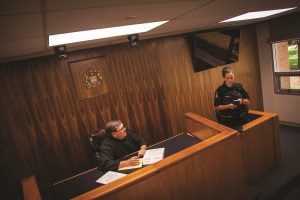There’s a room on campus that even most long-time staff members are surprised to find exists.  It’s at the end of the winding walk through the Andrew’s wing, very much out of the way. It’s full of windows that look out on the seasons and the expected desks and whiteboard at one end of the room.
It’s at the end of the winding walk through the Andrew’s wing, very much out of the way. It’s full of windows that look out on the seasons and the expected desks and whiteboard at one end of the room.
At the other end of the room, however, visitors are often amazed to see a very realistic looking courtroom, complete with wood panelled walls, a leather-lined judge’s bench, a witness stand, a well-worn Bible, and leather-lined tables and podiums for the prosecutor and defence. For students in the college’s Criminal Justice program, this is the setting of one of their most memorable learning experiences: the scenario-based training that gives students a sense of what real-world policing is like.
“I remember this place,” says Michelle Monette (Criminal Justice 2008), who now is an officer with the Lethbridge Regional Police Service and revisited the college courtroom earlier this year. “This was the most nerve-wracking experience. It was very stressful answering the questions.”
Her LRPS colleague Andrew Firby (Criminal Justice 2010), agreed. “It’s one thing to learn it on paper and to read the code,” he said. “But it was the hands-on stuff, the real experiences, that was how we really learned and understood it.”
The courtroom, which is furnished with donated furnishings from a Calgary courthouse, allows students to experience the roles of lawyer, accused, witness and police officer. An instructor sits as judge and other students watch as the scenes play out.
The courtroom is one of two places where Criminal Justice students get to practice real-life scenarios; there is also a small apartment set up on a second floor near the welding classrooms where professional actors come and challenge the students with different scenarios from domestic violence calls to drug busts.
The two settings are used in both capstone courses offered in the fourth and final semester of the Criminal Justice program, and both experiences are the ones most often cited by alumni of the program as the most beneficial and memorable.
This summer, the courtroom turned even more high-tech, with the addition of cameras and video monitors. The additions will provide future students observing the scenarios to see closeup views of the evidence and to study past scenarios as they are preparing for their own.
Criminal Justice instructor Ken Taylor, who has been teaching at the college 10 years, explained that students need to understand some of the challenging moments of policing: what it’s like to notify the next of kin when a loved one has died, what it’s like to handle evidence, and how best to recount their interviews and investigation before a judge. The courtroom and the apartment allow them to do just that. “It’s the practical aspects that really set our program apart,” Taylor said. “It’s not just all theory.”


